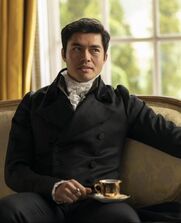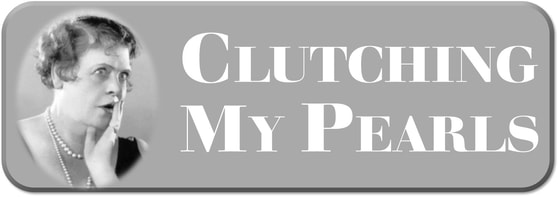 A plausible rival in Mr. Elliot
A plausible rival in Mr. Elliot In the book, after the concert where Wentworth gets jealous as he watches Mr. Elliot with Anne, she has the "delightful conviction" that Wentworth still cares for her, but she can see he is labouring under a misunderstanding. Anne worries about it. Due to social conventions, she cannot just walk up to him and let him know she still loves him. "How was such jealousy to be quieted? How was the truth to reach him? How, in all the peculiar disadvantages of their respective situations, would he ever learn of her real sentiments?"
Yes, how? The only impediment to Anne's Happy Ever After is the social convention that women did not declare their affection to men. That's it. Well, better she run the risk of losing Wentworth again, than go against the social convention! Will misunderstanding keep our lovers estranged from each other?....
| [Anne] tried to be calm, and leave things to take their course, and tried to dwell much on this argument of rational dependence:--"Surely, if there be constant attachment on each side, our hearts must understand each other ere long. We are not boy and girl, to be captiously irritable, misled by every moment's inadvertence, and wantonly playing with our own happiness." And yet, a few minutes afterwards, she felt as if their being in company with each other, under their present circumstances, could only be exposing them to inadvertencies and misconstructions of the most mischievous kind. |
Austen could have stretched out this misunderstanding, this estrangement between Anne and Wentworth. She had brought all her characters together in Bath, everything was in place for lots of complications, but she cuts it all short. She rejects going for extended misunderstandings. But for that, Persuasion would have been a three-volume novel of standard length.
Scholar Ellen Moody posted a very thought-provoking article about the foreshortened ending of Persuasion on her blog. Here's a key excerpt (thanks to Dr. Moody for allowing me to reproduce it here):
| [T]he novel is in a heavily unfinished state... the book was supposed to have the same kind of underlying hidden ironic story that we were to find out only at the close of a third volume. Since Anne did not have an opportunity to tell Lady Russell the truth about Mr Elliot, we were to have a Tuesday of intense mortification and reversal for both Anne Elliot and Frederick Wentworth (either at a card party organized by Lady Russell, or a gathering at a performance of a play bought by Charles for a Tuesday evening in Bath). We were to learn that Mrs Clay and Mr Elliot had a longer-standing relationship than Mrs Smith knows; as it stands, Anne Elliot says more than once that Mr Elliot's conduct does not make sense: we were to learn more about why he happened upon the party at Lyme, and why he looked so at her; we were to learn what was the package he was delivering for Mrs Clay in Bath and why she wanted to walk with him to the point of nearly making a point of it... [and we were to learn] what they were conferring over near the White Hart when spied by Mary Musgrove. |
I believe that there were more complications in store for Anne and Wentworth but Austen just decided to cut it all off and have "a something ready for publication." Why she tossed out the rom-com tropes we can only surmise, but perhaps it had to do with her failing health.
BTW, I don't fault the Netflix movie for trimming out Mrs. Smith. Mrs. Smith provides the revelation about Mr. Elliot's true nasty character, but as many scholars have noted, nothing comes of the revelation in the book. Anne doesn't even have time to tell Lady Russell about it before we have the scene when Wentworth overhears Anne talking and they are reconciled.
| Contrived Misunderstanding So, Austen used the well known rom-com tropes of misunderstanding and romantic triangle half-heartedly at best. We know Anne loves Wentworth, so we can't believe that Mr. Elliot is a rival. And because she had two intelligent protagonists, Austen concluded that using contrived misunderstanding involved a suspension of disbelief which she couldn't get on board for. The screenwriters of the new Persuasion put in those tropes that Austen came close to including, but rejected in the end. They amped up the impediments to the happy ending by amping up the contrived misunderstandings between Anne and Wentworth. Anne thinks that Wentworth is engaged to Louisa and she doesn't learn the truth from a letter. She just goes around misunderstanding things, like when Mary says "Louisa is going to marry a sailor," and Anne doesn't know she's referring to Benwick. The two times when Wentworth sees Anne with Mr. Elliot, it really looks like they are an item. The writers also did more with romantic triangles, Louisa-Anne-Wentworth and Wentworth-Elliot-Anne. And the movie's Wentworth was, in my opinion, the weak point in the romantic triangle; he was scruffy and sullen and wooden and it was impossible to conceive of him as a leader of men. I liked a few of his lines, but that was it. | Just too sulky and scruffy-looking for my taste--oh sorry, that's not Capt. Wentworth, that's the bug guy from Men in Black. |
As for the very altered character of Ann Elliot, others have said plenty about that. The movie's Anne Elliot lives by a completely different set of principles and values than Jane Austen's Anne Elliot, and evidently the filmmakers believed nobody could understand or relate to those principles and values, or perhaps they didn't understand those principles themselves, so they just excised Austen's Anne, just as the two modern Mansfield Park adaptations got rid of Austen's Fanny. Ellie Dashwood speaks well to this issue in her commentary. Austen's Anne is introverted, Dakota Johnson's Anne is miserable and self-absorbed. Here is another YouTube commentator who explains how the character was changed from a Austen's virtuous heroine to a flawed heroine. She also explains how Austen uses Mrs. Smith for contrast as someone who is cheerful despite her lot, as compared to constant complainers like Mary Musgrove.
I'll add that it baffles me that some have described the revised Anne as "empowered" and a "girlboss." I would even quibble with "feisty." The last thing she is, is a grown-up. Netflix's Anne enjoys making Lady Russell feel guilty for the advice that she gave to split up with Wentworth.
One thing both Annes have in common is that they are presented as the only sane ones in a crazy family. Surely there are enough modern readers and viewers who can relate to this feeling, and can relate to it in Austen's Anne, without the necessity (?) of changing out the original Anne for this neurotic woman-child. It is inexplicable why the writers of this movie have Captain Wentworth suddenly telling her she'd be a great naval leader and that he was always asking himself, WWAD? (What would Anne do.) She's a neurotic mess.
 Correct sulky scruffy guy
Correct sulky scruffy guy A lot of reviewers have commented on the device of having Dakota Johnson break the fourth wall. What struck me about it was how the writers relied on this gimmick for exposition, especially in the first half of the movie. Anne Elliot introduces all the characters, she tells us the backstory, she explains how people feel and behave. The people behind this movie don't seem to know how to use dialogue and uh, acting, to tell the story. And instead, they wasted what little screen time they had on dialogue that did not advance the story, like that bizarre octopus dream.
I've never seen so much exposition shoved out of the dialogue and into what is essentially voice-over narration, or telling instead of showing. I'd give more examples of what was done and what could have been done instead, but to do that, I'd have to watch the movie again and I don't want to.
Anyway, that's my three observations. If you enjoyed the movie, I'm glad. it's good to enjoy things.
Check out the page on Persuasion at Ellen Moody's website for a detailed timeline calendar of the book and other observations. Analysis, not Ad Hominem I have been just as interested in the debate around this Persuasion movie as I was in the movie itself, but that is another post, which I probably won't write. I'm not going to lie--I enjoy a scathing review, so long as it's not directed at anything I've written. On the other hand, I understand how it's not pleasant to be invested in some book, some movie, some singer, some interpretation of Jane Austen, and constantly run into people airing their tragically mistaken opinions on social media. For example, once I saw how passionately some people were about the BBC Sanditon mini-series, I refrained from going on Twitter, dropping into their threads, and pointing out how dreadful it was. Broadly speaking, however, I think the movie's critics have more eloquence on their side than the defenders do. I have seen many articulate reviews explaining why the production fails on an artistic level, or explaining how it differs from the source material. Or pointing out how god-awful the dialogue is. On the other hand, the defenders of the movie tend to indulge in ad hominem attacks, accusing the movie's detractors of being racists and Lady Catherine-types. More on the 18th-century novelist's toolkit: Death, Coincidence, and Misunderstanding. Previous post: An unromantic heroine Next post: A forgotten anti-slavery novel |
| When I wrote '"The Art of Pleasing," my short story about Mrs. Clay, I filled in some of the missing bits from Persuasion. I explain the errand that Mrs. Clay asked Mr. Elliot to run for her, near Milsom-Street, and I explained what she and Mr. Elliot were talking about when Anne spotted them across the street from the White Hart. The story is available in the Quill Ink anthology Rational Creatures. It's my most r-rated story, too. |



 RSS Feed
RSS Feed